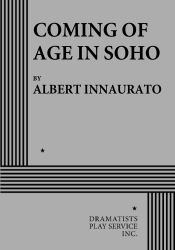
THE STORY: The scene is a loft in the Soho section of Manhattan, where a blocked writer named Bartholomew Dante (but called Beatrice) has fled to escape his wife of fourteen years and to come to terms with his art and his homosexuality. But his eagerly sought tranquility is interrupted by a series of unexpected visitors: first a young runaway, Di, who is escaping from prep school and uptight family; then an astonishingly precocious teenager with a German accent (Puer) who informs Beatrice that he is his son by a German terrorist with whom Beatrice had a brief but intense fling; and finally his estranged wife, Patricia, a Mafia-connected lawyer who is running for Congress and wants Beatrice back so as not to lose the Catholic vote. Caught in a sometimes poignant, sometimes hilarious crossfire of temptations and demands, Beatrice struggles to sort things out, for himself and the others, arriving, in the end, at a resolution that is filled with wisdom, rich with humor and touched with nobility—all at the same time.
A merrily bizarre mixture of fantasy and farce, which employs uncommon wit and telling perceptions to illuminate the plight of a “free spirit” determined to find liberation in a hostile world.
“The action is so bountiful, brimming over with comic and dramatic ingenuity—wonderful surprises (sight and sound)—that I can’t even think about it now without laughing…” —The New Yorker.
“The quality of Innaurato is his vitality and crazy sense of fantasy.” —New York Post.
“There are snazzy bits of invention, satisfying gags, and moments of bittersweet insight…” —New York Magazine.
“…bustling with the frenzy of imaginative life…the play has a heartiness and fullness of vision that is all too rare in the contemporary theater.” —The New York Times.